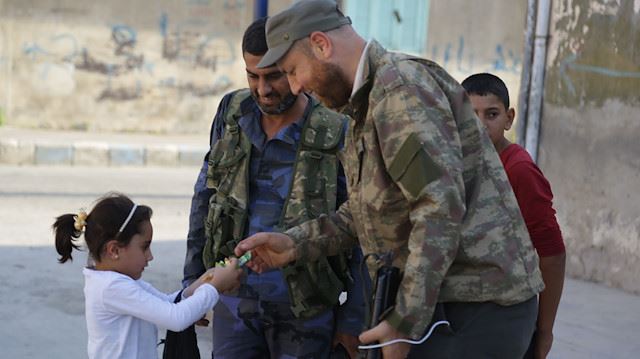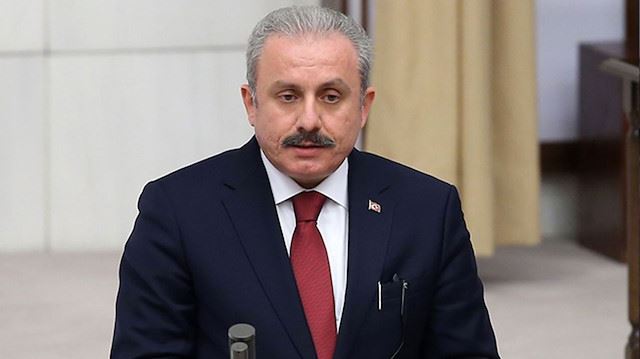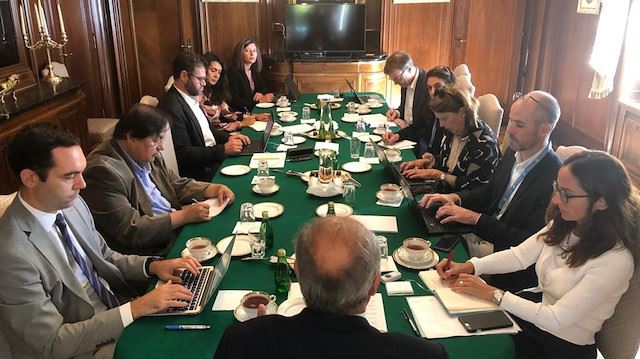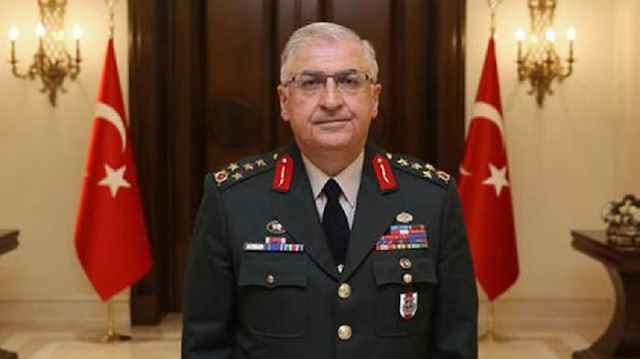The U.S. Treasury Department announced sanctions Monday on two Turkish ministries and three senior government officials over Turkey’s anti-terro
The U.S. Treasury Department announced sanctions Monday on two Turkish ministries and three senior government officials over Turkey’s anti-terror operation in northeastern Syria.
Washington imposed sanctions on Turkey’s Ministry of National Defense and Ministry of Energy and Natural Resources and also on Minister of National Defense Hulusi Akar, Minister of Energy and Natural Resources Fatih Donmez and Interior Minister Suleyman Soylu.
“We are prepared to impose additional sanctions on Government of Turkey officials and entities, as necessary,” the department said in a statement.
According to U.S. law, those mentioned on the sanctions list face blocking of their properties (if any) and are prevented from having trade relations with the U.S.
Turkey launched Operation Peace Spring on Oct. 9 to eliminate terrorists from northern Syria in order to secure Turkey’s borders, aid in the safe return of Syrian refugees and ensure Syria’s territorial integrity.
Ankara wants to clear northern Syria east of the Euphrates of the terrorist PKK and its Syrian offshoot, the PYD/YPG.
In its more than 30-year terror campaign against Turkey, the PKK — listed as a terrorist organization by Turkey, the U.S. and the European Union — has been responsible for deaths of 40,000 people, including women, children and infants.
The announcement came shortly after U.S. President Donald Trump said his administration “will soon” be issuing an executive order authorizing the possible imposition of sanctions on Turkey, including on current and former government officials.
In a statement posted on Twitter, he added that steel tariffs will again be raised to 50% and negotiations for a $100 billion trade deal will be stopped “immediately” by the U.S. Commerce Department.
In a press briefing with Treasury Secretary Steve Mnuchin, Vice President Mike Pence said Trump asked Turkey to halt its operation and to enact an immediate ceasefire and begin negotiations with the PYD/YPG.
“The president has directed me to lead a delegation to Turkey to begin these talks,” said Pence.
Turkey’s leaders have repeatedly said the operation does not target Kurds, contrary to rhetoric from anti-Turkey circles, which allege that the Turkish military is harming civilians and the fight against the remnants of the Daesh terror group.
On Saturday, Turkish President Recep Tayyip Erdogan said Turkey would assume responsibility for Daesh elements held in detention centers in northern Syria.
Turkish, Russian army chiefs speak over phone
The Turkish Armed Forces chief and his Russian counterpart spoke on the phone on Monday amid Turkey’s ongoing anti-terrorist operation in northern SyriaGen. Yasar Guler and Gen. Valery Gerasimov spoke on the security situation in Syria and recent developments, said a Turkish General Staff statement.Turkey on Oct. 9 launched Operation Peace Spring to eliminate terrorists from northern Syria in order to secure Turkey’s borders, aid in the safe return of Syrian refugees, and ensure Syria’s territorial integrity.Ankara wants to clear northern Syria east of the Euphrates River of the terrorist PKK and its Syrian offshoot, the PYD/YPG.In its more than 30-year terror campaign against Turkey, the PKK — listed as a terrorist organization by Turkey, the U.S., and the European Union — has been responsible for the deaths of 40,000 people, including women, children and infants.Russia has supported the Syrian regime in the country’s eight-year civil war.Although Turkey has opposed the Syrian regime, it has worked alongside Russia for peace in Syria through the Astana process.In 2017 the Astana peace process to end the Syrian conflict was spearheaded by Turkey, Russia, and Iran in Nur-Sultan (formerly Astana), Kazakhstan’s capitol, and since then has seen over a dozen meetings.

Turkey broke back of Daesh global money transfer system
Turkey has disrupted an illegal money transfer system used by the terrorist group Daesh, according to sources at Turkey’s financial crimes watchdog. Security forces targeted suspects accused of directing Daesh international money transfers using the “Hawala” system, said the sources from the Financial Crimes Investigation Board (MASAK) who asked not to be named due to restrictions on speaking to the media.During the operations, some foreign currency Daesh had planned to send was seized and the Hawala system was cracked, added the sources.Daesh used Turkish- and Syrian-based jewelry firms or exchange offices as fronts for money transfers, they said.These illegal foreign exchange chains, such as Al-Khalidi, Al-Hebo jewelry, Al-Haram, and Saksouk, were investigated by MASAK in 2016-2017. During this period, the accounts of 18 individuals and five companies suspected of being included in the illegal money transfer chain of Al-Hebo and Al-Khalidi were blocked for seven days by Turkey’s Treasury and Finance Ministry.Some 24 natural and three legal entities linked to Al-Haram were also referred to authorities during the probe.A MASAK analysis led prosecutors to charge individuals who ran the illegal Hawala chain with financing terrorism and conducting unlicensed payment activities.

Syrian National Army will protect minorities: spox
The rights of all local minorities will be secured after the conclusion of Turkey’s counter-terror operation in northern Syria in league with the Syrian National Army (SNA), an SNA spokesman said on Monday.Yusuf Hamoud’s statements came at a panel organized by Ankara-based think tank SETA with the attendance of Hasan Hamada, the Syrian Interim Government’s deputy defense minister, and the SNA’s Mustafa Secari along with researchers and diplomatic representatives.He said the SNA is the greatest unification movement that has been fighting the Bashar al-Assad regime since 2011, when the civil war broke out, adding that it has 80,000 trained soldiers organized into seven units.He went on to underline that the YPG/PKK terror group made Turkey’s counter-terror operation — Operation Peace Spring — necessary as it forced thousands of civilians to migrate, forcibly recruited children, and assassinated political activists.”We aim to establish a unitary Syrian state by securing the rights of all minorities,” he said.He added that he was shocked by the Arab League’s condemnation of the Turkish operation, saying: “Those countries condemning [Operation Peace Spring] remained silent in the face of the terror group’s [YPG/PKK] war crimes.”Calling on Syrian Kurdish civilians not to abandon their homes in the operation territory, Hamoud continued:”When we liberated [Syria’s] Afrin region of terrorism [in March 2018], the PKK terror group forced civilian Kurds to migrate by oppressing them… After getting in touch with our Kurdish brothers, some of those who abandoned the region returned home.”Civilian authority”The SNA will not administer the region. Once the region is cleared of terror, we will hand it to a civilian authority to facilitate peaceful coexistence,” he said, assuring Kurds, Assyrians and Christian civilians about the region’s safety in the near future.Hamada, the Syrian Interim Government’s deputy defense minister, for his part, said the SNA became much more professional since Turkey’s Operation Olive Branch.Hamada went onto say that the interim government prioritizes security and safety in regions rid of terrorism and seeks to ensure the total eradication of terrorism.Secari of the SNA said the operation was in response to demands by civilians in the region oppressed by the YPG/PKK terror group.Turkey on Oct. 9 launched Operation Peace Spring to eliminate terrorists from northern Syria in order to secure Turkey’s borders, aid in the safe return of Syrian refugees, and ensure Syria’s territorial integrity.Ankara wants to clear northern Syria east of the Euphrates River of the terrorist PKK and its Syrian offshoot, the PYD/YPG.In its more than 30-year terror campaign against Turkey, the PKK — listed as a terrorist organization by Turkey, the U.S., and the European Union — has been responsible for the deaths of 40,000 people, including women, children and infants.

NATO allies should back Turkey’s anti-terror push: official
It is strange for Ankara to see its allies in the NATO bloc supporting a terrorist group that Turkey is fighting on the ground, said a senior Turkish official on Monday. “While we as Turkey expect our allies in NATO to stand beside us against terrorist organizations, we are surprised to see that some of our allies are on the side of the terrorist organization,” Turkish Parliament Speaker Mustafa Şentop said, referring to the terrorist PKK and the YPG/PYD, its Syrian offshoots. His remarks came in Belgrade, Serbia’s capital, during his visit to attend the 141st Assembly of Inter-parliamentary Union between Oct. 13-17. Sentop said that he does not find countries’ criticisms of Turkey’s anti-terrorist operation in northern Syria — launched last week — “rational, legal, or sincere.”Noting that Daesh, as it is for many countries, is a bloody terrorist organization in Turkey, Sentop said the PKK and its extension, the Syrian PKK, the PYD/YPG, is a bloody terrorist organization like Daesh.”We ask our NATO allies: Is your ally Turkey or is the PKK terrorist organization?” said Sentop. On Turkey’s current anti-terrorism push in northern Syria, Sentop said Operation Peace Spring’s sole aim is to stem the threat of terrorism from the region. Turkey on Wednesday launched Operation Peace Spring to eliminate terrorists from northern Syria in order to secure Turkey’s borders, aid in the safe return of Syrian refugees, and ensure Syria’s territorial integrity. Ankara wants to clear northern Syria east of the Euphrates River of the terrorist PKK and its Syrian offshoot, the PYD/YPG. In its more than 30-year terror campaign against Turkey, the PKK — listed as a terrorist organization by Turkey, the U.S., and the European Union — has been responsible for deaths of 40,000 people, including women, children, and infants.

Turkey slams global media reports on Syria operation
Turkey called on international media outlets Monday to stop publishing manipulative reports on the country’s military operation in northeastern Syria.Sadik Arslan, the permanent representative of Turkey to the UN’s Geneva office, hosted journalists from international news outlets to inform them regarding Turkey’s Operation Peace Spring.Arslan expressed his discomfort about the international media publishing manipulative and one-sided news about the operation.He said YPG/PKK terrorists targeted civilians and journalists on the Turkish side of the border with mortars and using snipers, but foreign media journalists located there failed to report properly that these terrorists were the ones who conducted the attacks.Arslan said the YPG/PKK has conducted hundreds of attacks against residential areas in Turkey since the start of the operation and 18 civilians have been killed, including a nine-month-old baby.He also criticized reports which claimed that Turkey is fighting against the Kurds.Turkey has the largest Kurdish population in the world, Arslan said, adding the country does not have any problems with the Kurds and the operation is only being conducted against the YPG/PKK terrorists.He said Turkey had opened its doors to Kurds from Syria’s northern city of Ayn al-Arab (Kobani) in 2014 when it was besieged by Daesh.Around 200,000 people, mostly Syrian Kurds, had fled to Turkey then while the siege was ongoing.Arslan said Turkey was also the only country to welcome hundreds of thousands of Kurds from northern Iraq when Iraq’s former leader Saddam Hussein attacked them with chemical weapons.Turkey on Oct. 9 launched Operation Peace Spring to secure its borders by eliminating terrorist groups there to ensure the safe return of Syrian refugees and Syria’s territorial integrity.Ankara wants to clear northern Syria east of the Euphrates of the terrorist PKK and its Syrian offshoot, the PYD/YPG.In its more than 30-year terror campaign against Turkey, the PKK — listed as a terrorist organization by Turkey, the U.S. and the European Union — has been responsible for deaths of 40,000 people, including women, children and infants.*Writing by Fatih Hafiz Mehmet in Ankara
